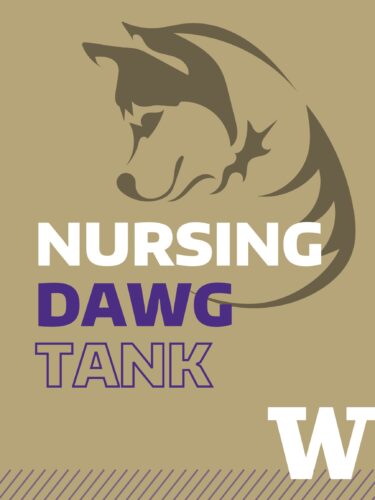Nursing Dawg Tank
Nursing Dawg Tank
 Dawg Tank was Thursday, November 30, 2023!
Dawg Tank was Thursday, November 30, 2023!
Thank you to those of you who joined us for Nursing Dawg Tank. This year’s theme is Digital Health Innovation. We heard three nurse researchers make their “pitch” for the next innovation in nursing that will improve health outcomes and change lives. During the event, UW Nursing faculty and student researchers presented a research idea that they hope to launch to make an impact on their community before a live audience. At the end of the event, the audience help choose one project that received a $15,000 award to address some of our community’s most pressing issues.
Congratulations to Dr. Weichao Yuwen and Priscilla Carmiol Rodriguez for their innovative AI research.
Echoing the format of the TV program “Shark Tank”, we invite a panel of leaders in the healthcare and innovation fields to ask our presenters questions about their research projects during the event.
Read more about the 2023 event
Learn more about the 2023 presenters/researchers
Learn more about the 2023 panelists
Read more about past Dawg Tank recipients below:
May 2022
Dr. Sarah Gimbel, PhD, MPH, BSN, FAAN
Project: “Resourcing Liberation: Systems Improvement + Nurse Navigation to Optimize Care Continuity for Youth involved in the Criminal Legal System”
May 2021
Jenny Hsin-Chun Tsai PhD, ARNP, PMHCNS-BC
Eunice Soh (PhD student)
Project: “Virtual Simulation Training for Adult Family Home Workforce”
This project is to develop virtual reality, remotely accessible education and training system for the adult family home caregiver workforce. Capitalizing on technology advancement, we intend to design an electronic learning environment that mimics different adult family home settings, residents, and scenarios for students to practice caregiving skills, their multiple roles, and their health and safety protection in an integrated way.
November 2019
Dr. Joelle Fathi
Project: “Combatting the Electronic Cigarette Epidemic and Protecting our Youth”
The Seattle Public School system wishes to update current prevention, intervention, and cessation practices for students who violate the Tobacco on School Property policy and their parents. An evidence-based education module to inform and assist parents of adolescents who break the Use of Tobacco on School Property policy is needed.
April 2019
Dr. Anita Souza, PhD
Project: Health Education Leadership Partnership
This program will bring evidence-based resources directly to service providers. This program will train frontline service providers who are working directly with adults to recognize support those who are aging in housing services with chronic health conditions.
October 2018
Dr. Jennifer Sonney, PhD, ARNP, PPCNP-BC, FAANP, FAAN
Project: Improving Asthma Care Together
Funding from Dawg Tank provided a critical bridge for our team to develop a functional prototype of our solution, IMPACT, for further testing and refinement. Specifically, we fabricated a novel wearable symptom watch that allows children to report asthma symptoms as they occur. We also developed a companion health application for tracking symptom trends and guiding families through shared asthma management skill building.
May 2018
Dr. Ira Kantrowitz-Gordon, PhD, CNM, ARNP, FACNM, FAAN
Project: “Don’t Judge Me: A Hidden Consequence of Opioid Addiction”
Funding will develop high quality videos to tell the stories of these mothers, to humanize this problem of mothers who give birth to babies addicted to opioids. The videos will be based on incredibly compelling real stories of mothers and nurses from our research. We will use these videos to teach undergraduate and graduate nursing students about the experiences of new mothers with opioid addiction. The videos will facilitate discussions on how to overcome stigma, communicate with empathy, and provide much needed support.
October 2017
Dr. Sarah Gimbel, PhD, MPH, BSN, FAAN
Project: “Bringing Global Lessons Home: Gardens and Pathways and the Microbiome”
Funding from Dawg Tank allowed us to introduce and amplify the nursing engagement on this project. Specifically, we built a strategic partnership for School of Nursing faculty and students to engage in this work on an ongoing basis, and more importantly bring critical lessons learned home around the environmental health, microbiome and community health nursing to our homeless encampments and other marginalized communities in the Seattle area.